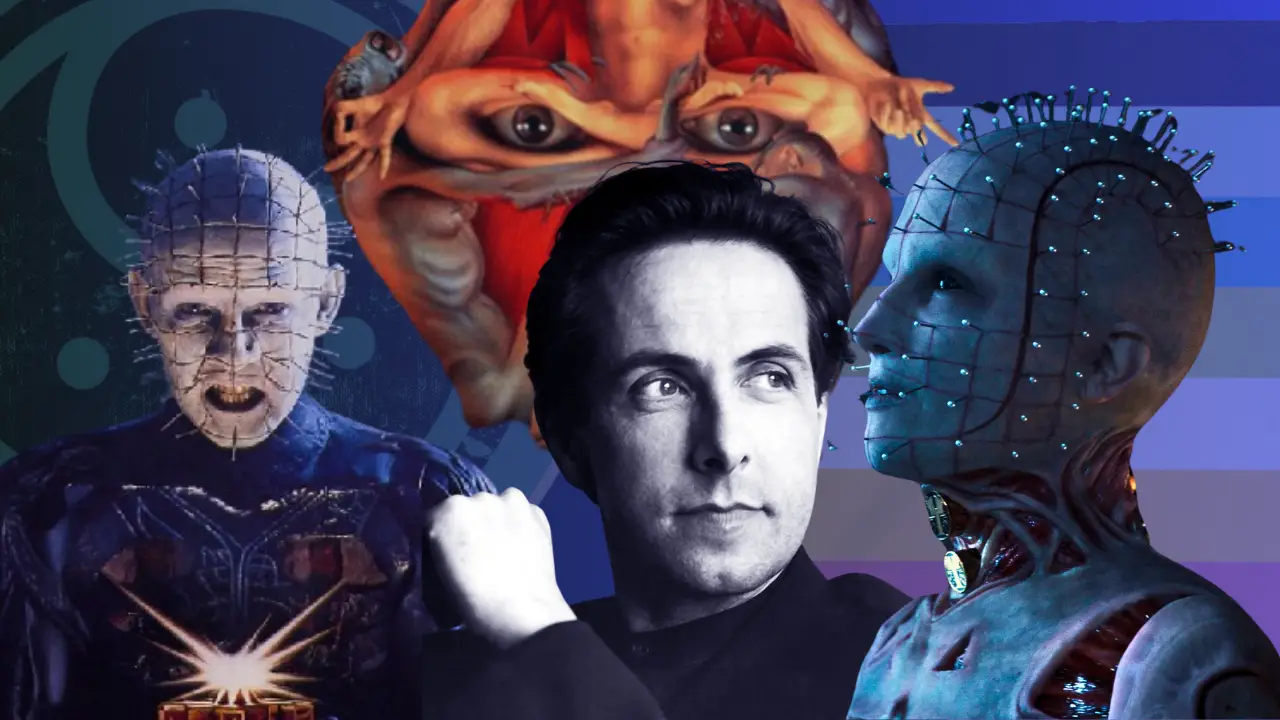Clive Barker was born and raised in Liverpool, England. Though he comes from a fairly average upbringing, he became known for being anything but ordinary and would eventually revolutionize the horror genre.
It’s hard to pinpoint the exact year he came out of the closet, but Barker’s first officially open public relationship began in 1975. Since then, he’s discussed the issues and judgements that come with being an openly gay horror writer.
Many LGBQTIA+ horror enthusiasts will tell you that Barker created an emotional safe space where none could previously be found.
He’s also reached the kink world in similiar ways by utilizing the premise of pleasure through pain via his 1986 novella The Hellbound Heart.
Clad with tight leather, piercings, and a clear affinity for the pleasure of pain and punishment, the Hell Priest character in The Hellbound Heart leaves the realm of tortured souls to collect those on earth who engage with the Lament Configuration puzzle box to discover the pleasures of “things unknown”.
There’s been speculation over the years that everything about Hellraiser (the feature film adaptationj of The Hellbound Heart) is an allegory for both the eroticism of kink and the LGBQTIA+ community. Though they’re closely intertwined, they’re not always related. Many of us secretly did want to discover the pleasures of “things unknown”.
The social atmosphere of the 1980s was nowhere near friendly enough for open acceptance, yet Barker’s voice was heard loudly by his fans. He was a trailblazer and a pioner of sex positivity.
When I started waving the freak flag, I began facing all of the issues that came along with it. There’s a realization that comes with Barker’s allegory. The mention of “pleasure and pain” includes the pain of being open about who you are, even though honesty feels amazing.
In Hellraiser it’s your curiosity that introduces suffering, only for you later to become a disciple of it as a lower level cenobite. The difference between curiosity, and turning into all that you’ve discovered, are met with a very thin line.
The kink community is in close relation to the previously stated. Though Clive Barker provides an avenue for acceptance, it also comes with a warning.
Nowadays, the platform for expressing ourselves and who we are is way bigger. Many horror fans who also happen to be into kink and/or are queer will tell you that Clive Barker helped pave the road that led us here. Kink is now so much more than a concept disguised within horror because it’s more palatable.
The times have changed. Though the Hell Priest was initially written as an androgynous character, they were depicted as a male played by Doug Bradley in the 1987 version of Hellraiser. However, in it’s 2022 remake of the same name, beloved trans actress and model Jamie Clayton took on the role of pinhead. Modern society is a bit more kind to those of us who don’t fit into neatly wrapped boxes. Though the war continues, the battle has made huge strides. There was once a time when it would’ve been impossible to see a trans woman take on such a strong leading role. And the fact that it’s a reality today can only be interpreted as progress.
Actor Doug Bradley has stated on more than one occasion, that “everything about Hellraiser is transgressive”. The ethics and morals represented within the film serve as a harsh reality for those who need one. Otherwise, it presents as a roadmap towards self acceptance through testing and facilitating boundaries. After all, cenobites are demons to some and angels to others. Clive Barker opened the box and we came.








:quality(85):upscale()/2023/09/26/713/n/1922564/64fd2ffd651301af9f0cb6.51954832_.jpg)



















